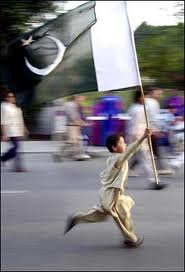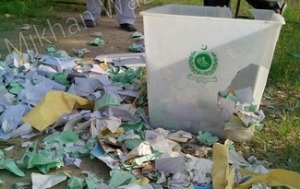Plundering of Pakistan:Reko Diq & Saindak Copper,Gold & Rare Elements Stolen By West in Collusion with Nawaz Sharif
Fears grow about Reko Diq Gold mines…Baloch senator says deal offered to China; government denies
Shaheen Sehbai
Wednesday, August 28, 2013
From Print Edition
WASHINGTON: While major world mining and investment companies are preparing to invest big time, big money in Balochistan, specially in the mining sector, suspicions and doubts that the biggest gold mine of Reko Diq may be quietly handed over to China as part of the growing economic ties are also coming to the fore.
Official and business circles have been wondering for some time what will happen to the multi-hundred billion dollar Reko Diq gold and copper mines after the world’s largest mining company, Barrick Gold of Canada, was thrown out of Pakistan by the Supreme Court of Pakistan during the PPP regime.
But after the recent visit of high level government delegation to China and a flurry of quick MoUs and super-paced exchange of visits, an important leader from Balochistan, former Senator Sana Baloch has alleged publicly that the government has promised these mines to China in a year or so.
While the Government leaders strongly denied any deal or any promise made during the Beijing visit, an official Pakistan Government statement assuring that the Reko Diq mines will be given to the highest bidder in an international tender is still awaited.
Meanwhile as the wait continues, world mining companies are expecting and waiting for Pakistan to float international the tenders inviting bids for Reko Diq and some are ready to offer more than $100 billion in 30 to 35 years, insiders of the mining industry say.
The ousted Barrick Gold had promised less than a billion a year in 56 years but they never shared what they had found during the many years of exploration they did in Reko Diq. What is generally believed is that Reko Diq is bigger than Afghan Aynak mines which were estimated by President Karzai at over $3 trillion.
Sana Baloch’s charge has come amid a frenzy of shuttle economic activity between Islamabad and Beijing. A top level economic delegation led by Zhang Xiaoqiang, vice chairman National Development and Reforms Commission (NRDC) is in Islamabad today and was asked by Federal Minister for Planning and Development Ahsan Iqbal to raise ceiling of Chinese investments in Pakistan to $10 billion from present $3 billion.
The government has been speaking about Chinese investments of between $18 to $20 billion in Gwadar-Kashgar Highway, the bullet train and Lahore-Karachi Motorway in the coming years but what is not yet been explained is how the Chinese will be repaid for these investments.
One form of repayment is now being suspected in the form of handing over the $300 billion plus Reko Diq mines to China on the pattern of the Saindak Copper mines, at almost a throw-away price.
Senator Sana Baloch has made this allegation: “Chinese authorities were assured of getting the world’s richest copper-gold deposit, Reko-Diq, by next year – again without following international transparent norms.” “Shady deals in the name of brotherly relations have deprived the people of Balochistan of any benefits they can get from these resources. Not a single contract has ever been made public,” the angry senator from Balochistan says. “I repeatedly requested details of agreements and contracts signed during the Musharraf regime, but to no avail.”
The Reko Diq issue is awaiting a decision in the international arbitration forums where the Canadian Barrick Gold has filed cases against Pakistan for compensation. These cases may be decided in a few months and involve only a few million dollars but the world mining market is preparing seriously for bidding for the mines in a big way as these companies realize that Reko Diq offers billions of dollars of profits and financial opportunity for the host country.
In one such case, three weeks back the Delloite Finance Corporation of Canada, the single largest professional services organization in the world in 2010, issued a Letter of Interest, through its mining division, to an American mining company preparing for the big tender in a joint venture with a major Australian capital markets investment organization which has at least 10 world class mining companies ready to bid for Reko Diq.
Experts fear that if the Government did not opt for a transparent international tender for Reko Diq, hundreds of billions of dollars may be lost in the coming years just like the Saindak Copper mines where Pakistan did not benefit significantly as General Musharraf first gave the mines to China and then extended the deal for another five years.
No details of what Pakistan gained are available as against the potential and the promises that were made but Senator Sana Baloch says Gwadar, Saindak, the Duddar Lead-Zinc project and several other such deals are a complete mystery for the common Baloch.
He says the multi-billion copper-gold Saindak project is being extracted, without any monitoring in the past 10 years by a Chinese company. “According to official reports, copper-gold worth $633.573m was extracted during 2004-08. The Balochistan government received a paltry two percent share, while half the profits go to Beijing and 48 percent to Islamabad,” he says in an article sent to The News. (see page-6)
For Reko Diq the Supreme Court, although in a veiled reference, guided the Government of Balochistan to hold an international tender like the one held in Afghanistan’s Anyak Copper deposit.
In the Afghan tender, supervised by the World Bank, eight international companies from many countries had contested. It was globally reported that a Chinese company allegedly tried to bribe a Minister in Afghanistan paying him $30 million but was caught.
Experts say if for an investment of up to $20 billion over the next 20 years, the Chinese are handed over the multi-hundred billion Reko Diq mines, in a non-transparent manner, it would be the greatest open and shut robbery and treachery with the country.
By getting what is its right, Pakistan can build many motorways and bullet trains on its own, provided the rulers keep the national interest in mind, says one mining expert.
The Plunder of Saindak’s Cooper and Gold
 By Yousaf Ajab Baloch
By Yousaf Ajab Baloch
Saindak cooper-gold mine is also included in the Baloch’s mineral resources that mark Balochistan as a rich land. Despite existence of gold and copper with great amount and value, Baloch nation is unable to benefit from it as because Chinese exploitation of Baloch resources is continued with great assistance of state authorities and establishment. The Saindak production or so-called Baloch share has never been utilized for development of Baloch and Balochistan.
The Saindak Copper and Gold mine is located in Chagi district of Balochistan. Discovery of copper deposits at Saindak was made in 1970s in collaboration with Chinese engineering firm and the feasibility study of Saindak project was started in 1975. The Saindak mine was estimated to have ore reserves of 412 million tones containing on average 0.5 gram of gold per ton and 1.5 grams of silver per ton. According to official estimates, the project has the capacity to produce 15,800 ton of blister copper annually, containing 1.5 ton of gold and 2.8 ton of silver.
In 1995, production at Saindak copper and gold mine started with the funding of Government of Pakistan. The Saindak Copper-Gold Project was set up by Saindak Metals Ltd, a company owned by the Pakistan, by the end of 1995 at a cost of PKR 13.5 billion. In initial trial months, monthly production rate was 1700 tons of copper, 6000 ounces of gold and 12000 ounces of silver. At first the copper was to be refined in China, the technical partner in the project; it was suggested that a refinery be built at Saindak; however, after a decade it has not been done.
The Benazir government closed down the project late in 1995, saying lack of funds to continue project and low price of copper in international market. The Nawaz government did not take interest in starting this project. In addition, it is said that state bureaucracy opposed Saindak project over building the necessary infrastructure , including the RCD Highway section from Dalbandin to Saindak, taking the rail to Saindak from Taftan and other facilities. It also remained a big shock for the people of Balochistan when first time a number of Baloch people were employed. It should be noted that above mentioned development was made merely for the Chinese interest and benefit.
The government of Pakistan In 2002, invited foreign investors to provide funding for the project and awarded the mining project to the Metallurgical Corporation of China (MCC) Ltd under a 10-year lease due to expire in October 2012. MCC agreed to pay an annual rent of $500,000 for the mine to the Government of Pakistan. The distribution of profits was according to a formula, beyond ones understanding. The Chinese company took 75% the Federal government 24% and only 1% of revenue was passed onto the Balochistan Government.
Shortly, the Saindak Copper-Gold Project (SCGP) SCGP is a copper mining project that has been of no use or benefit for the Baloch people. The initial operational agreement between MCC and Government of Pakistan was for 10 years upto 15-Oct-2012. The agreement further extended for a period of 05 years i.e. up to 15-Oct-2017. MCC is running this project through its subsidiary MRDL (MCC Resources Development Company Pvt Limited) registered with Securities and Exchange Commission of Pakistan.
Unfortunately, there is no detailed examination of minerals from the international laboratory with the view to know the exact ratio of copper and gold in the minerals being extracted from the Saindak mines and there is no idea of costly ores of the copper and gold being extracted by the Chinese Company. The China has been given free hand to exploit Baloch resources. The minerals valuing billions of dollars are being swindled since the Chinese company invested only 23 million dollars and in return it holds the whole resources of Saindak project and there has not been independent monitoring in the project.
The agreement and handing over the Saindak project has always been against the will of Baloch people, even the so-called governments have not been consulte , as last year in 2012 the federal cabinet approved a five year extension in the lease of the Saindak project till 2017.
The company claims to have paid 13.4 million dollars as presumption tax and 6 million dollars surcharges between periods of 2002 to 2012. It also claims provision of jobs to 1600 local people in mining and running the plant. The company says that it is upgrading schools and health services and provides scholarships to students of the area; however, the claims go against the reality. According to the local people the project area is a no go area for Baloch people and employed people in the project belong to the other provinces or are non-Baloch including presence of Baloch in the project is equal to none. The people in surrounding areas of the village and district say that there is no development in any sector of the life initiated by Chinese company. The district officials of Chagi confirm that no money from this project has been utilized for district development.
Ransack of Saindak copper and gold proves that the federation is only interested to exploit Baloch resources with the help of China. This project could bring a great economic change in the condition of entire Balochistan; even it did not develop the nearby villages and district in last years.
The enormous pillage of copper and gold by China is not justified from the land of Balochistan, as does not return in the shape of development or amount. However, the resistance movement in Balochistan and political struggle justifies that Baloch movement for their rights and ownership of land is right and on the basis of realism. Because the Saindak project is only a single example and we can find numbers of instances in which Baloch people are undervalued and Baloch resources are looted with both ends particularly by China.
Bibliography:
Lack of Democracy and Soci-Economic Development of Balochistan: Sheikh Asad Rahman
Saindak Project on The move: Siddque Baloch
Saindak gold mines again given to Chinese company: Khalid Mustafa
De Unkown Baloch By Mir Mohammad Ali Talpur
The revival of Sandak project : Shamim Ahmed Rizvi
China digs Pakistan into a hole :By Syed Fazl-e-Haider
China now wants to gulp Gawadr after digest of Saindak: Ahmed Khan Baloch
Balochistan’s missing money: Sanaullah Baloch
Published in The Baloch Hal on September 4, 2013
The total area of the Reqo Diq gold mines is said to be spread over 13,000 square kilometres and was valued over $3 trillion. TCC had been given mining rights for only 99 square kilometres. PHOTO: FILE
ISLAMABAD / QUETTA: After losing its case in the Supreme Court of Pakistan, the Tethyan Copper Company (TCC) has turned to pressure tactics and filed compensatory claims in the international arbitration court to regain what it lost in the wake of the court ruling on the Reko Diq gold and copper reserves.
In a press note issued on Thursday, TCC – a consortium of Canada-based Barrick Gold and Chile-based Antofagasta Minerals – said it had decided not to pursue the grant of a mining lease for the Reko Diq reserves, and would seek monetary compensation instead for ‘damages’ inflicted by the federal and Balochistan governments’ alleged breaches of contract and treaty rights.
“Recent developments have regrettably compelled TCC to withdraw the request for specific performance,” said TCC chief executive officer Tim Livesey in his statement.
“TCC invested enormous time, effort and capital in the Chaghai district.”
“Through that investment, we took a small copper exploration target in a previous unexplored segment of the Tethyan belt and developed it into a world class mining project at Reko Diq.” The TCC CEO maintained that while the company had long hoped to mine Reko Diq, the conduct of Pakistan and Balochistan has made that goal impracticable.
“The federal and provincial governments have not responded to our many attempts to engage, have prevented TCC from participating in the development of the new mining sector in the province, and have denied both TCC and the people of Balochistan and Pakistan the enormous benefits that our project would have brought to the country,” he maintained.
“We will pursue our claims for monetary damages, including lost profits for the mining operations, in the international arbitration,” Livesey’s statement concluded.
While determining the amount of compensation TCC may receive in case it is awarded a decision in its favour is a wild guess at this stage, experts say it could range as high as a few billion dollars. TCC’s investment in the exploration and mining of Reko Diq will be the determining factor in case the decision is announced against Pakistan.
According to officials of the Provincial Mines and Mineral Development, TCC had invested around $200 million and expected the damages claims would be just slightly higher.
Some see TCC’s shift from claiming the mining rights of Reko Diq to seeking compensation for damages as a desperate attempt to force the newly-elected government back to the negotiation table.
“TCC is not giving up its so-called mining rights… they were in fact taken away from them by the Supreme Court,” said Raza Kazim, the lawyer who fought the Reko Diq case on behalf of private parties in Balochistan.
He maintained TCC’s move was not a new one. The Canadian High Commission had earlier threatened to take the step in a letter written to the government of Pakistan. Through the letter, the high commission sought an out-of-court settlement, threatening that the ‘biggest award in the history of arbitration’ would be issued against Pakistan if it failed to do so, Kazim said. He added that the letter was placed on the SC record.
In its ruling, a three-judge bench of the apex court, headed by Chief Justice Iftikhar Muhammad Chaudhry, stated that the agreement reached on July 23, 1993 was in conflict with the laws of the country.
The total area of the Reqo Diq gold mines is said to be spread over 13,000 square kilometres and was valued over $3 trillion. TCC had been given mining rights for only 99 square kilometres.
MRDL paid $39.8m in royalties for Saindak since 2003
According to a source, Chinese state-owned mining company MRDL has deposited $39.8 million with the Balochistan government in royalties for the Saindak Copper and Gold Project over the past decade.
A source said MRDL had financed the project by providing $10 million for the rehabilitation of the local population and $15 million as working capital. The company has paid $220 million to the federal government as its share in profit, $6 million as the lease rent of the project, $13.4 million as presumptive tax and $6 million as development surcharge during the period from 2002 to 2012.
Published in The Express Tribune, June 14th, 2013.










